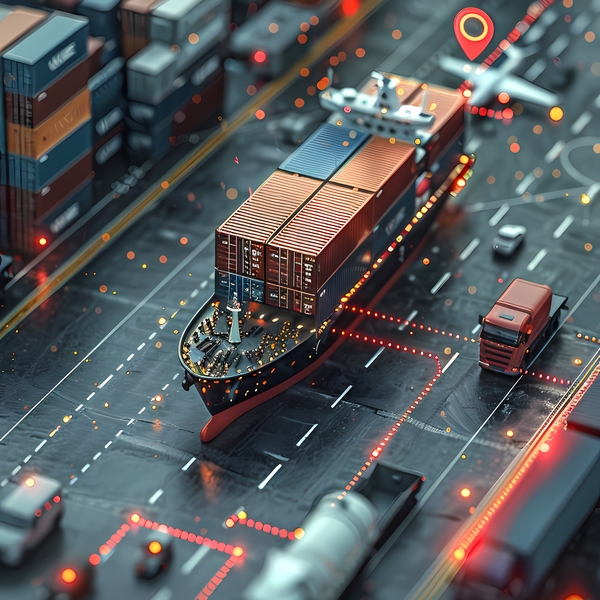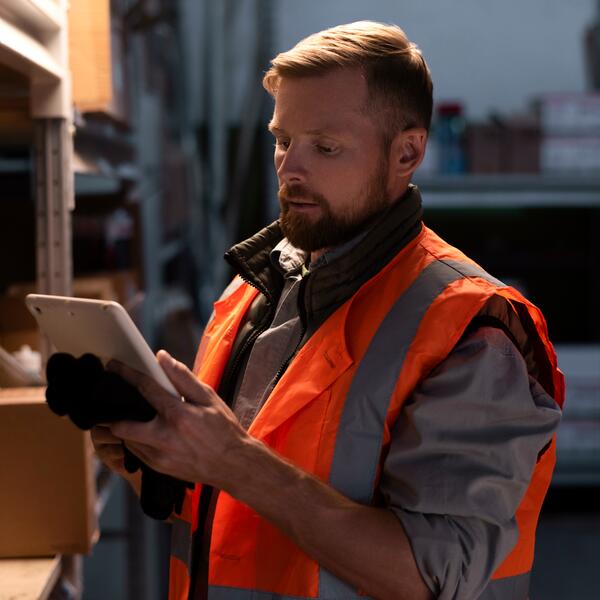B2B-logistiek: alles wat je moet weten

Je hebt vast wel eens gehoord dat tijd geld is. Dit wordt extra duidelijk als een bedrijf winst misloopt door slechte logistiek. Zie logistiek als het skelet van een bedrijf; het is het raamwerk waarop andere operationele plannen worden gebouwd.
Hoewel het simpel klinkt, kan logistiek op den duur het verschil maken tussen winst en verlies voor een bedrijf. Vaak richten bedrijven zich meer op business-to-consumer (B2C) logistiek en vergeten ze business-to-business (B2B) logistiek. Toch is B2B-logistiek net zo belangrijk, zo niet belangrijker.
B2B-logistiek houdt namelijk de hele toeleveringsketen draaiende. Het stelt bedrijven in staat om efficiënt te werken, concurrerend te blijven en uiteindelijk hun klanten beter van dienst te zijn.
Moovick geeft een nieuwe invulling aan de manier waarop bedrijven hun logistiek kunnen stroomlijnen. We zullen de kernaspecten van B2B-logistiek en moderne oplossingen zoals D+1-verzending nader toelichten.
Wat is B2B-logistiek?
B2B-logistiek verwijst naar het vervoer, de coördinatie en het beheer van goederen tussen twee bedrijven. Het vindt plaats tussen bedrijven in plaats van tussen een bedrijf en een individuele klant, in tegenstelling tot B2C. Het omvat alles wat met een bedrijf te maken heeft: van grondstoffen die naar een fabriek worden verzonden, tot groothandels die grote bestellingen aan detailhandelaren leveren, tot magazijnen die voorraad distribueren voor e-commerceverkopers.
De schaal is meestal groter dan bij B2C-logistiek en er staat meer op het spel. Bedrijven zijn van elkaar afhankelijk om te kunnen functioneren, wat betekent dat een vertraagde levering of een voorraadtekort een kettingreactie kan veroorzaken in het hele leveringsnetwerk.
Een autofabrikant moet bijvoorbeeld onderdelen op tijd geleverd krijgen; elke vertraging legt de productielijnen stil. Hetzelfde geldt voor een detailhandel die afhankelijk is van groothandels voor tijdige aanvulling van de voorraad om omzetverlies te voorkomen.
Wat zijn de uitdagingen voor B2B-logistiek?
De grootste uitdaging voor B2B-logistiek is de complexiteit van toeleveringsketens. Denk bijvoorbeeld aan een bedrijf als Amazon, dat een enorm netwerk van distributeurs en vervoerders heeft. Het coördineren van zo'n netwerk is een enorme opgave. Dit wordt nog moeilijker wanneer elke partner verschillende systemen en processen gebruikt.
Maar er zijn nog meer uitdagingen:
- Hoge operationele kosten
Stijgende brandstofprijzen, opslagkosten en een tekort aan arbeidskrachten maken logistieke activiteiten duur. Zonder optimalisatie kunnen de kosten uit de hand lopen.
- Beperkte zichtbaarheid en tracking
Veel bedrijven hebben moeite met het gebrek aan realtime updates. Niet weten waar een zending zich bevindt of wanneer deze aankomt, leidt tot inefficiëntie en een slechte klantervaring.
- Regelgevende hindernissen
Het is gebruikelijk dat vervoerders te maken krijgen met nalevingskwesties in de internationale logistiek, met name met betrekking tot douanedocumenten en tarieven.
- Veranderende verwachtingen van klanten
Bedrijven verwachten steeds vaker snelle, betrouwbare en flexibele levering, vergelijkbaar met wat consumenten gewend zijn van e-commercegiganten. Zonder moderne oplossingen is het een uitdaging om aan deze eisen te voldoen.
Intelligente B2B-logistieke oplossingen opzetten
Intelligente B2B-logistiek is simpelweg het integreren van kunstmatige intelligentie in een logistiek systeem. Je maakt dus gebruik van technologie, automatisering en innovatieve processen om intelligente logistiek voor je bedrijf op te zetten.
Belangrijke onderdelen zijn:
- Automatisering van routinewerkzaamheden: Je gebruikt software voor dingen als planning en facturering om handmatige fouten te verminderen.
- Real-time volgsystemen: GPS-tools zoals FleetUp geven je inzicht in zendingen, waardoor je minder onzekerheid hebt en real-time gegevens krijgt.
- Voorspellende analyses: Door gegevens uit het verleden te analyseren, kun je de vraag voorspellen, voorraadtekorten voorkomen en je voorraad optimaliseren.

- Flexibele transportoplossingen: Met een flexibele transportoplossing kun je makkelijk opschalen of afschalen als de vraag verandert, zodat je bedrijf altijd soepel blijft draaien.
- Integratie tussen systemen: Tools zoals Zapier zorgen ervoor dat magazijnen, vervoerders en winkels makkelijk informatie kunnen delen, zodat er geen misverstanden ontstaan.
Het idee van slimme B2B-logistiek is om on-demand leveringen te verbeteren.
Wat is on-demand levering?
On-demand levering verwijst naar logistieke diensten waarmee bedrijven leveringen kunnen plannen en uitvoeren op basis van onmiddellijke behoeften, in plaats van vaste of langetermijnschema's.
Zie het als het Uber-model toegepast op logistiek. In plaats van dagen te wachten tot goederen worden verzonden, kunnen bedrijven vrijwel direct om ophaling en levering vragen. Het idee is om de efficiëntie te verhogen in sectoren waar snelheid en aanpassingsvermogen cruciaal zijn voor de bedrijfsvoering.
E-commercebedrijven hebben on-demand levering nodig voor:
- Snellere uitvoering
Dit betekent dat kopers hun bestellingen sneller ontvangen. In plaats van dagen of weken te wachten, worden producten sneller geleverd, waardoor winkelen gemakkelijker en aangenamer wordt.
- Flexibiliteit tijdens pieken in de vraag
Soms krijgen bedrijven te maken met een plotselinge toename van het aantal bestellingen, bijvoorbeeld tijdens Kerstmis, Black Friday-uitverkoop of wanneer een product plotseling erg populair wordt. Met een flexibel systeem kunnen bedrijven deze piekperiodes opvangen zonder dat ze zonder voorraad komen te zitten of hun personeel overbelasten.
- Lagere last-mile-bezorgkosten
De ‘last mile’ is de laatste stap van de bezorging, waarbij een product van het magazijn naar de deur van de klant gaat. Dit is net zo belangrijk bij business-to-business-transacties. Deze fase is vaak het duurst. Door slimmere bezorgroutes en netwerken te gebruiken, kunnen bedrijven kosten besparen en verspilde ritten minimaliseren, zoals wanneer een chauffeur een lange afstand aflegt om slechts één klein pakketje te bezorgen.
- Verbeterde klantloyaliteit
Als klanten hun artikelen snel en betrouwbaar ontvangen, zijn ze tevreden. Tevreden klanten komen meestal terug om opnieuw te kopen, bevelen het merk aan bij vrienden en hebben meer vertrouwen in het bedrijf.
Tot nu toe lag de nadruk op snelheid en aanpassingsvermogen als cruciale elementen van efficiënte logistiek. Maar veel intelligentere logistiek kijkt naar D+1-verzending, een efficiëntere manier van B2B-logistiek.
Wat is B2B D+1-verzending?
D+1-verzending betekent levering binnen één dag na verzending. Als een bestelling vandaag wordt verzonden, komt deze morgen aan.
Dit model is vooral belangrijk voor B2B-bedrijven die afhankelijk zijn van een snelle doorlooptijd om hun activiteiten draaiende te houden. Voorbeelden hiervan zijn:
- Fabrikanten die dringend grondstoffen moeten aanvullen.
- Detailhandelaren die populaire producten aanvullen tijdens periodes van grote vraag.
- E-commercebedrijven die klanten levering op de volgende dag beloven.
On-demand en D+1 logistiek kan best duur zijn om zelf te regelen. Je hebt betrouwbare mensen nodig om het werk te doen en alle logistieke knooppunten moeten met elkaar verbonden zijn om de keten in stand te houden. Als je zelf niet genoeg capaciteit hebt om aan de logistieke eisen van je bedrijf te voldoen, is een betrouwbare partner echt belangrijk. Kleine en middelgrote ondernemingen, evenals e-commercebedrijven, moeten gebruikmaken van betrouwbare Third-Party Logistics (3PL)-partners die flexibel zijn en zich kunnen aanpassen aan hun veranderende behoeften. Denk aan een partner die binnen handbereik is.

Moovick's Pocket Transport Logistics voor bedrijven
Pocket Transport Logistics gebruikt mobiele technologie en apps om logistieke processen te stroomlijnen. Dit betekent snellere processen, meer efficiëntie en meer gemak, samen met updates binnen handbereik. Logistiek mag je bedrijf niet vertragen, en dit zijn de oplossingen op maat die we kleine en middelgrote bedrijven bieden via de Moovick-app:
- Vereenvoudigde logistiek en betrouwbaarheid: Bedrijven verspillen vaak uren aan handmatige coördinatie, eindeloze telefoontjes en het vertrouwen op onbetrouwbare transportaanbieders die de bedrijfsvoering vertragen. Wij lossen dit op met directe boekingen, automatisering en een netwerk van betrouwbare, geverifieerde vervoerders die altijd op tijd leveren.
- Kostenefficiëntie en transparantie: Traditionele koeriersdiensten belasten bedrijven met starre prijsmodellen, hoge koerierskosten en verborgen kosten. Moovick biedt een kostenefficiënt, pay-as-you-use-model met volledig transparante prijzen, zodat bedrijven alleen betalen voor wat ze nodig hebben, zonder verrassingen.
- Flexibiliteit en realtime controle: Veel kleine en middelgrote bedrijven worstelen met starre leveringsschema's en een gebrek aan zichtbaarheid zodra een zending onderweg is. Met Moovick krijgen bedrijven flexibiliteit op aanvraag – voertuigen zijn direct beschikbaar wanneer dat nodig is – en realtime tracking biedt volledige controle en gemoedsrust.
- Naadloze betalingen en voertuigopties: Ingewikkelde facturering en het niet kunnen vinden van het juiste type voertuig vertragen de bedrijfsvoering. Ons transportsysteem neemt deze hindernissen weg door naadloze digitale betalingen met facturering met één klik aan te bieden, plus een breed scala aan voertuigen – van bestelwagens tot vrachtwagens – zodat bedrijven altijd de perfecte oplossing krijgen.
Hoe Moovick je kan helpen bij het beheren van B2B-logistiek
Het beheren van logistiek hoeft niet overweldigend te zijn. Moovick combineert technologie en flexibele leveringsoplossingen om kleine en middelgrote bedrijven te helpen voorop te blijven lopen.
Logistiek is meer dan alleen het vervoeren van goederen; het gaat er nu om hoe je het kunt gebruiken om een concurrentievoordeel voor je bedrijf te creëren.
Onze oplossingen zijn ontworpen om transportdiensten voor levering en distributie te vereenvoudigen, zodat bedrijven zich makkelijker kunnen richten op groei en het bedienen van hun klanten. Klaar om je volgende zending te verzenden en wil je dat het goed gaat? Begin hier.







